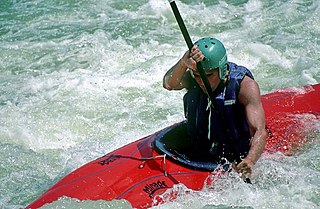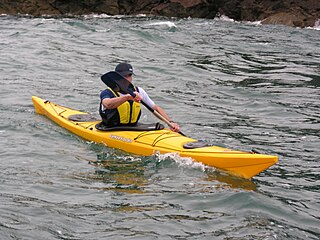
A kayak is a small, narrow human-powered watercraft typically propelled by means of a long, double-bladed paddle. The word kayak originates from the Inuktitut word qajaq. In British English, the kayak is also considered to be a kind of canoe.

Kayaking is the use of a kayak for moving over water. It is distinguished from canoeing by the sitting position of the paddler and the number of blades on the paddle. A kayak is a low-to-the-water, canoe-like boat in which the paddler sits facing forward, legs in front, using a double-bladed paddle to pull front-to-back on one side and then the other in rotation. Most kayaks have closed decks, although sit-on-top and inflatable kayaks are growing in popularity as well.

Canoeing is an activity which involves paddling a canoe with a single-bladed paddle. Common meanings of the term are limited to when the canoeing is the central purpose of the activity. Broader meanings include when it is combined with other activities such as canoe camping, or where canoeing is merely a transportation method used to accomplish other activities. Most present-day canoeing is done as or as a part of a sport or recreational activity. In some parts of Europe canoeing refers to both canoeing and kayaking, with a canoe being called an open canoe.

A sea kayak or touring kayak is a kayak used for the sport of paddling on open waters of lakes, bays, and oceans. Sea kayaks are seaworthy small boats with a covered deck and the ability to incorporate a spray deck. They trade off the manoeuvrability of whitewater kayaks for higher cruising speed, cargo capacity, ease of straight-line paddling (tracking), and comfort for long journeys.
A folding kayak is a direct descendant of the original Inuit kayak made of animal skins stretched over frames made from wood and bones. A modern folder has a collapsible frame made of some combination of wood, aluminium and plastic, and a skin made of a tough fabric with a waterproof coating. Many have integral air chambers inside the hull, making them virtually unsinkable.

Canoe slalom is a competitive sport with the aim to navigate a decked canoe or kayak through a course of hanging downstream or upstream gates on river rapids in the fastest time possible. It is one of two kayak and canoeing disciplines at the Summer Olympics, and is referred to by the International Olympic Committee (IOC) as Canoe/Kayak Slalom. The other Olympic canoeing discipline is canoe sprint. Wildwater canoeing is a non-Olympic paddlesport.

Adam Joseph van Koeverden is a Canadian sprint kayaker and politician. He is an Olympic gold medallist in the K-1 500m category (2004) and a two-time world champion in K-1 500 (2007) and K-1 1000 (2011), winning four Olympic and eight world championship medals. His home club is the Burloak Canoe Club in Oakville, Ontario.

The Canadian Canoe Museum, located in Peterborough, Ontario, Canada, is a museum dedicated to canoes. The museum's mission is to preserve and share the culture and history of the canoe's enduring significance to the peoples of Canada through an exceptional collection of canoes, kayaks, and paddled watercraft."

A sprint canoe is a canoe used in International Canoe Federation canoe sprint. It is an open boat propelled by one, two or four paddlers from a kneeling position, using single-bladed paddles. The difficulty of balance can depend on how wide or narrow the canoe is, although regularly the less contact a canoe has with the water the faster it goes. This makes the narrower boats much faster and popular when it comes to racing.

Quatsino Provincial Park is a provincial park in British Columbia, Canada, located on Quatsino Sound on northern Vancouver Island. The park was established July 12, 1995 and is 654 hectares in size. The park is 50 kilometres (31 mi) west of Port Hardy, British Columbia and is accessible by rough logging roads or by boat. Quatsino is on a popular kayaking route.
The ICF Canoe Sprint World Championships are an international event in canoe racing, one of two top-tier Summer Olympic sport events organized by the International Canoe Federation. They are usually held every non-Olympic year and have officially included paracanoe events since 2010; paracanoe-specific editions of this event are usually held in Summer Paralympic years.

Kayak is a metasearch engine for travel services, including airline flights, hotels, rental cars, and vacation packages. It is owned and operated by Booking Holdings.

Hungary competed at the 1976 Summer Olympics in Montreal, Quebec, Canada. 178 competitors, 124 men and 54 women, took part in 109 events in 17 sports.

Canoe Kayak Canada is the governing body of competitive canoeing and kayaking disciplines in Canada. The three specific disciplines represented are flatwater, whitewater and marathon. Canoe Kayak Canada officially replaced the name "Canadian Canoe Association" in 2005, although the former title is still used by the organization. The name change came about from a desire to include the kayaking discipline in the organization's name.
The 1986 ICF Canoe Sprint World Championships were held in Montreal, Canada at the Notre Dame Island. This is also where the canoeing and rowing competitions for the 1976 Summer Olympics took place.
The 1990 ICF Canoe Sprint World Championships were held in Poznań, Poland, on Lake Malta.
The 1994 ICF Canoe Sprint World Championships were held in Mexico City, Mexico for the second time at neighboring Xochimilco. The Mexican city had hosted the event previously in 1974 at the same venue that hosted the canoeing and rowing competitions for the 1968 Summer Olympics.
The 1997 ICF Canoe Sprint World Championships were held in Dartmouth, Nova Scotia, Canada on Lake Banook.

Canoe marathon is a paddling sport in which athletes paddle a kayak or canoe over a long distance to the finish line. The International Canoe Federation states standard distance races are at least 10 kilometres (6.2 mi) without an upper limit, while short distance races are between 3.4 kilometres (2.1 mi), and 10 kilometres (6.2 mi). Many events are raced down sections of river, including currents or portages around obstacles. Some events attract thousands of competitors and are staged over several days.

Canoeing – recreational boating activity or paddle sport in which you kneel or sit facing forward in an open or closed-decked canoe, and propel yourself with a single-bladed paddle, under your own power.













